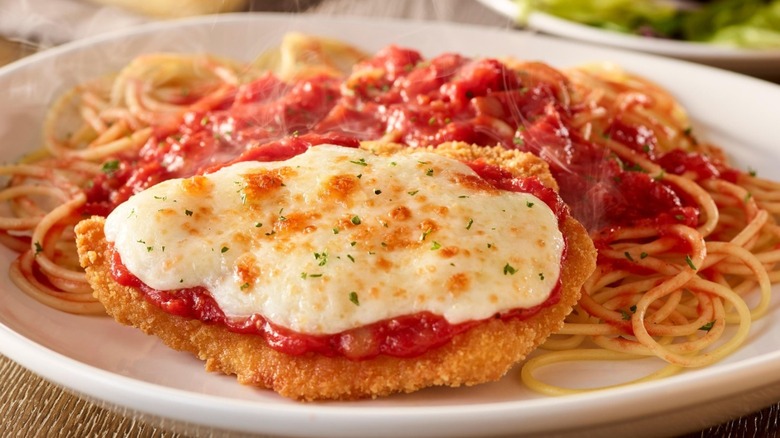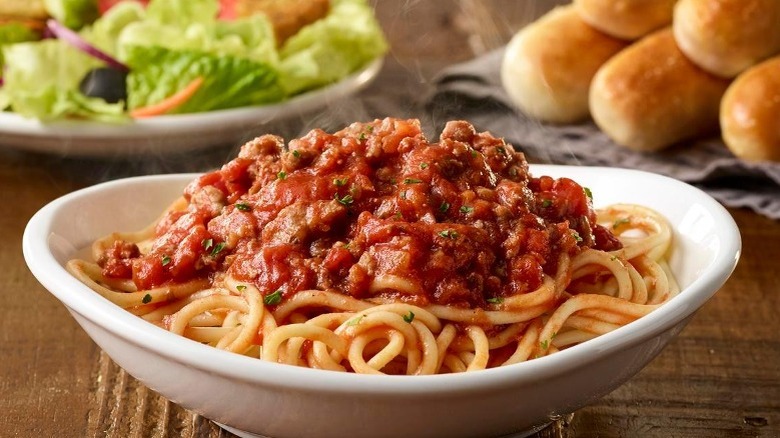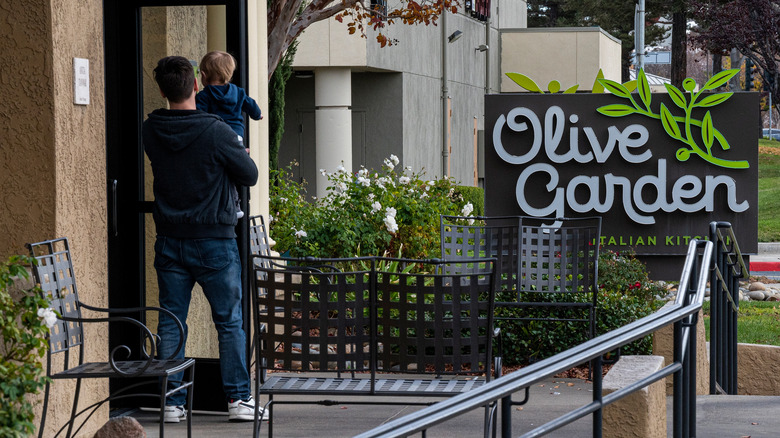Olive Garden Has Been Committing A Culinary Crime With Its Pasta
Is Olive Garden good? You can make a good argument for it, sure. Is it true authentic Italian food? No. Although Olive Garden borrows heavily from Italian cuisine, the chain restaurant doesn't follow certain culinary traditions or practices usually done in Italy or its surrounding regions. One such practice that Olive Garden doesn't do is add salt to its pasta water.
Of course, this doesn't sound all that bad, all things considered. You can go and eat all sorts of pasta dishes from Olive Garden and still find it to be pretty good, so what's the big deal? Salting the water before adding your pasta is widely believed to be a traditional Italian method, commonly done to add extra flavor to the pasta. Salt also removes the starch from noodles, keeping them from clumping or sticking together while they boil in the water. This way, the pasta is not only flavorful but it's not a clumpy mess.
Salting pasta water doesn't sound like it's time-consuming, or even that complicated, so why exactly would Olive Garden skip it to begin with? Could it be that it's so minor a step that the chain just doesn't see it as necessary to include it in all of its pasta recipes? The answer, in fact, has more to do with the warranty of Olive Garden's cooking ware than it does any sort of deviation from tradition.
Olive Garden wants to keep the warranty on its pots
Olive Garden's reasons for avoiding salting its pasta isn't because it dislikes Italian tradition. Instead, it's more about keeping the warranty good on all of the pots and pans each restaurant has in its kitchens without voiding it.
Olive Garden executives have explained that using copious amount of salt in its pasta dishes would void the warranty on their pots so it's easier and cheaper to skip over this step and keep a longer warranty on their cookware by avoiding any unnecessary damage caused by heavy salting. Olive Garden also argues that, with the number of sauces available for the pasta, it's not like customers would be losing flavor anyway. After all, with everything from alfredo to marinara, wouldn't guests still be getting a very salty pasta dish even without salted pasta water?
Others have argued that, for a company that prides itself on Italian cuisine and all things pasta, Olive Garden's reason to avoid following such a simple rule is incredibly trivial. These critics argue that Olive Garden should focus more on giving guests the best and most authentic experience possible instead of scrambling over themselves to save a few extra dollars. Olive Garden, however, seems confident in its current methods that it doesn't need to change anything. Why fix something that isn't broken, they reason. But it seems even certain shareholders would prefer Olive Garden adopt this cooking method.
The demand for Olive Garden to change its ways is high
Now, there'll be people on the Internet who will demand that Olive Garden begin the practice of salting its pasta, pot warranties be darned. Of course, compared to the large number of people who still eat at Olive Garden, these people are just loudly voicing their complaints. But it seems a certain stockholder in Olive Garden's parent company would prefer to see the restaurant begin salting its pasta water– if only to improve business at least.
In 2014, Starboard Value, a company which owns 8.8% of Darden Restaurants' shares, released a comprehensive 300-slide presentation directed at Olive Garden on how to improve its profit margins. Although most of the presentation detailed how Olive Garden could better operate its real-estate locations, several slides made several unconventional suggestions. The suggestions ranged from adopting the practice of salting pasta water, reinforcement of proper "breadstick procedures," the overdressing and overfilling of salad, and even how the menu is designed and printed.
Olive Garden, for what it's worth, claimed that it would keep an open mind towards Starboard's suggestions, although they have not adopted the practice of salting their pasta water as of yet. Perhaps Olive Garden, while maintaining some Italian traditions, would prefer to make its own path instead of being held down by rules or expectations.


